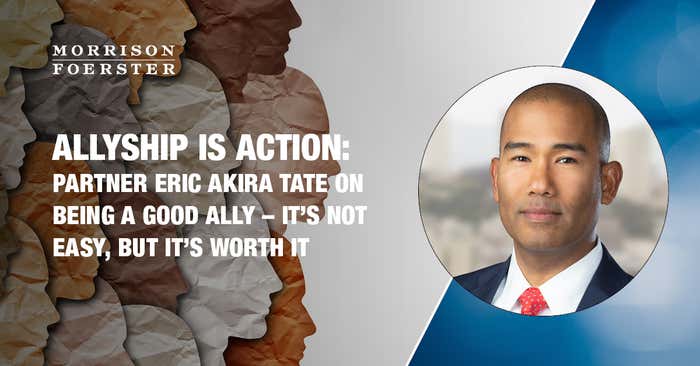
On September 17, 2020, MoFo partner and co-chair of the firm’s Employment and Labor Group Eric Akira Tate spoke on a panel entitled, “Stepping Up for Justice and Being a Good Ally,” in which leaders in the legal community discussed this important subject. The panel was one of three live virtual roundtable discussions hosted by the Justice & Diversity Center (JDC) of the Bar Association of San Francisco (BASF) as part of the 16th Annual JDC Gala. This lively discussion was moderated by Catherine Ongiri, Judicial Council of California and member of JDC’s Board of Directors. Other panelists included: Kelly Dermody (Lieff Cabraser Heimann & Bernstein); Judge Laurel Beeler of the U.S. District Court, Northern District of California; and Monica Oca Howell (Justice & Diversity Center).
The discussion began with a simple question: What does it mean to be an ally? Eric kicked off the conversation, citing as an example an anecdote about when he attended a meeting of the governing Council for the American Bar Association’s (ABA) Section of Labor and Employment Law the day after the killing of George Floyd. Eric recalled how late into the meeting, the topic of George Floyd had not been raised, but Kelly Dermody, a white woman and fellow Council member, spoke up and asked if the meeting was going to conclude without anyone bringing up the topic. The ensuing conversation ultimately led to a commitment by the Council of the ABA Section of Labor and Employment Law to participate in a 21-Day Racial Equity Habit-Building Challenge. Many law firms and other organizations, including MoFo, also participated in the Challenge.
The panel discussion provided many practical tips for those in the legal profession to recognize their own privilege, and how to use that privilege to become an effective ally to marginalized and historically underrepresented communities. Some key takeaways include:
- Being an ally is about taking action to empower others. Even comparatively small gestures such as offering to call the police on a stranger’s behalf because the stranger is being harassed for being of a certain race or ethnicity, or amplifying a colleague’s contribution when she is talked over in a meeting, can be effective ways to be an ally.
- Being an ally is not easy or comfortable. To the contrary, being an ally at its core involves delving into uncomfortable situations. But an ally can generally assume that whatever level of discomfort he or she may encounter or feel as an ally, is dwarfed by the discomfort and pain felt by those persons for whom the ally is seeking to come alongside.
- Being an ally is recognizing that, even if the negative impacts of issues like racial injustice do not directly affect you as part of your everyday experience, they affect the greater societal structure in which you operate and thus, ultimately do impact you.
- It is crucial to have an open heart and develop a growth mindset, which can be achieved as you immerse yourself in learning about other’s lived experiences. It was noted that in this process, the goal is not reach a destination, but rather to embark on a lifelong journey of self-education.
- Being an ally is understanding that your role is not to “save” other people or advocate for your own agenda, but rather to stand side by side with marginalized groups and support them as they see fit. One cannot be an effective ally by assuming and displacing leadership of these communities—even with good intentions—without actually listening to or understanding their needs, or acknowledging the entirety of the circumstances leading to their current experience. Talk a little and listen a lot.
- Words have power, and those aspiring to be effective allies must be prepared to have difficult conversations in a variety of situations, whether it is in responding to a racial slur used in casual conversation among friends, or standing up to someone in the street. It takes courage to do so, and you can better position yourself to be an ally by understanding what your priorities and limits are.
If you would like to access a recording of the panel discussion, please watch BASF’s video.
In this Allyship Is Action video, Eric discusses the challenges of talking to your children about issues of race at an early age, reminding us that listening is also an important part of communicating with them.